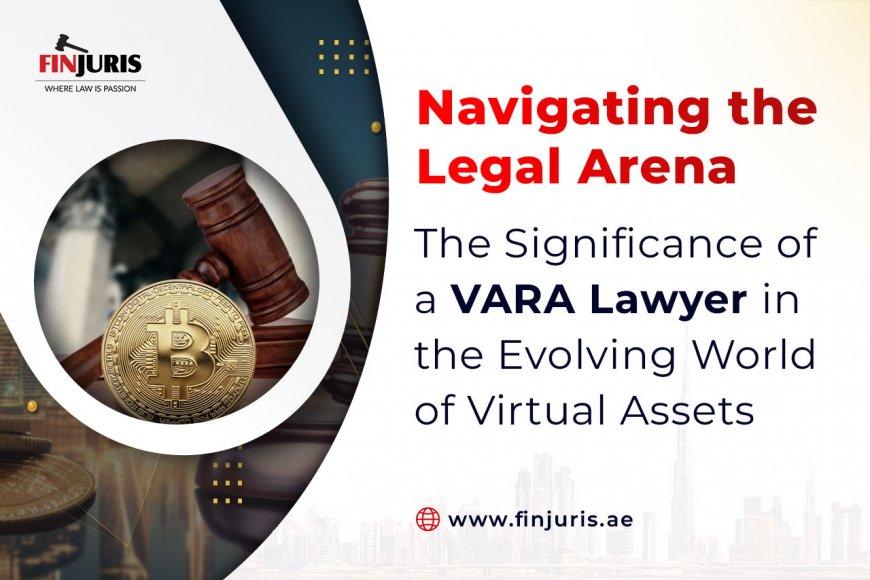Navigating the Legal Arena: The Significance of a VARA Lawyer in the Evolving World of Virtual Assets
Virtual assets, such as cryptocurrencies and digital tokens, have emerged as a disruptive force in the global financial system.

Virtual assets, such as cryptocurrencies and digital tokens, have emerged as a disruptive force in the global financial system. As these digital assets gain popularity, governments and regulatory bodies throughout the world are wrestling with the necessity to create comprehensive legal frameworks to oversee their usage and trade. In this environment, the formation of Virtual Asset Regulatory Authorities (VARA) and the employment of a VARA lawyer are becoming increasingly important. This essay delves into the changing regulatory framework governing virtual assets, the function of a VARA lawyer, and the ramifications of the Virtual Assets Law.
Recognizing Virtual Assets and the Need for Regulation
Virtual assets, often known as cryptocurrencies or digital currencies, are digital representations of value that are transferred electronically. Unlike traditional fiat currencies, virtual assets are based on decentralized networks that use blockchain technology to provide safe and transparent transactions. The growth of virtual assets has created both possibilities and difficulties, including worries about investor protection, financial stability, and illegal activities like money laundering and terrorist funding.
In response to these issues, governments and regulatory bodies have begun to create regulatory frameworks for the usage and trade of virtual assets. The goal of these rules is to achieve a balance between encouraging innovation and protecting consumer protection, market integrity, and economic stability. Central to these initiatives is the formation of Virtual Asset Regulatory Authorities (VARA), which are responsible for supervising and regulating the virtual asset ecosystem in their respective jurisdictions.
The Function of a VARA Lawyer:
A VARA lawyer plays an important role in managing the complicated legal landscape of virtual assets. These legal specialists focus on virtual asset regulation and compliance, offering legal advice and representation to people, corporations, and regulatory bodies. VARA lawyers perform a wide range of activities, including:
- Regulatory Compliance: VARA lawyers help clients understand and comply with regulatory requirements for virtual assets, such as registration, licensing, reporting, and disclosure duties.
- Policy Advocacy: VARA lawyers support policy changes and regulatory efforts that foster innovation while protecting consumer interests and financial stability. They collaborate with politicians, industry stakeholders, and regulatory agencies to shape the development of virtual asset legislation.
- Due Diligence and Risk Assessment: VARA attorneys do due diligence and risk assessments to determine the legality and compliance hazards connected with virtual asset transactions, investments, and business operations.
- Dispute Resolution: VARA attorneys help customers resolve disputes involving virtual asset transactions, regulatory enforcement actions, and compliance problems. They offer legal advice and representation in mediation, arbitration, and litigation cases.
- Education and Training: VARA lawyers educate and teach clients and industry stakeholders on virtual assets law, compliance best practices, and new legal trends. They participate in thought leadership efforts, write papers, and give talks to increase awareness and knowledge of virtual asset challenges.
Implications of Virtual Assets Law:
The adoption of Virtual Assets Law marks a significant milestone in the regulation of virtual assets. These rules establish a complete legal framework for regulating the issue, trading, and custody of virtual assets, as well as the operations of virtual asset service providers. Key provisions of the Virtual Assets Laws include:
- Licensing and Registration Requirements: Virtual Asset Service Providers (VASPs), which include virtual asset exchanges, wallet providers, and custodians, are often required by law to get licenses or register with regulatory agencies. These regulations seek to maintain the integrity and security of virtual asset services while also protecting customers from fraud and misbehavior.
- Anti-Money Laundering (AML) and Counter-Terrorist Financing (CTF) Measures: Virtual Asset Law requires VASPs to comply with AML and CTF regulations, which include client due diligence, transaction monitoring, and suspicious activity reporting. These steps are intended to prevent the criminal use of virtual assets while also increasing the transparency and integrity of the virtual asset ecosystem.
- Investor Protection: Virtual Asset Laws include provisions for investor protection, such as disclosure requirements, investor education campaigns, and dispute resolution processes. These laws aim to protect the interests of virtual asset investors while also promoting market integrity and confidence.
- Market Oversight and Enforcement: Virtual Asset Laws allow regulatory bodies to monitor and enforce compliance with virtual asset rules. Regulatory agencies may undertake audits, inspections, and investigations to monitor VASP operations to guarantee regulatory compliance. Noncompliance with Virtual Asset Laws can lead to fines, sanctions, or license revocation.
The rise of virtual assets has marked a new age of innovation and upheaval in the global financial environment. As governments and regulatory bodies try to create comprehensive legal frameworks to manage the virtual asset ecosystem, the job of VARA lawyers becomes increasingly important. VARA lawyers play an important role in navigating the complicated regulatory framework around virtual assets by offering legal advice, advocacy, and representation to both clients and regulatory bodies. VARA lawyers' experience in virtual asset regulation and compliance helps to establish strong and effective regulatory frameworks that support innovation while protecting consumer interests and financial stability in the virtual asset ecosystem.
What's Your Reaction?




















